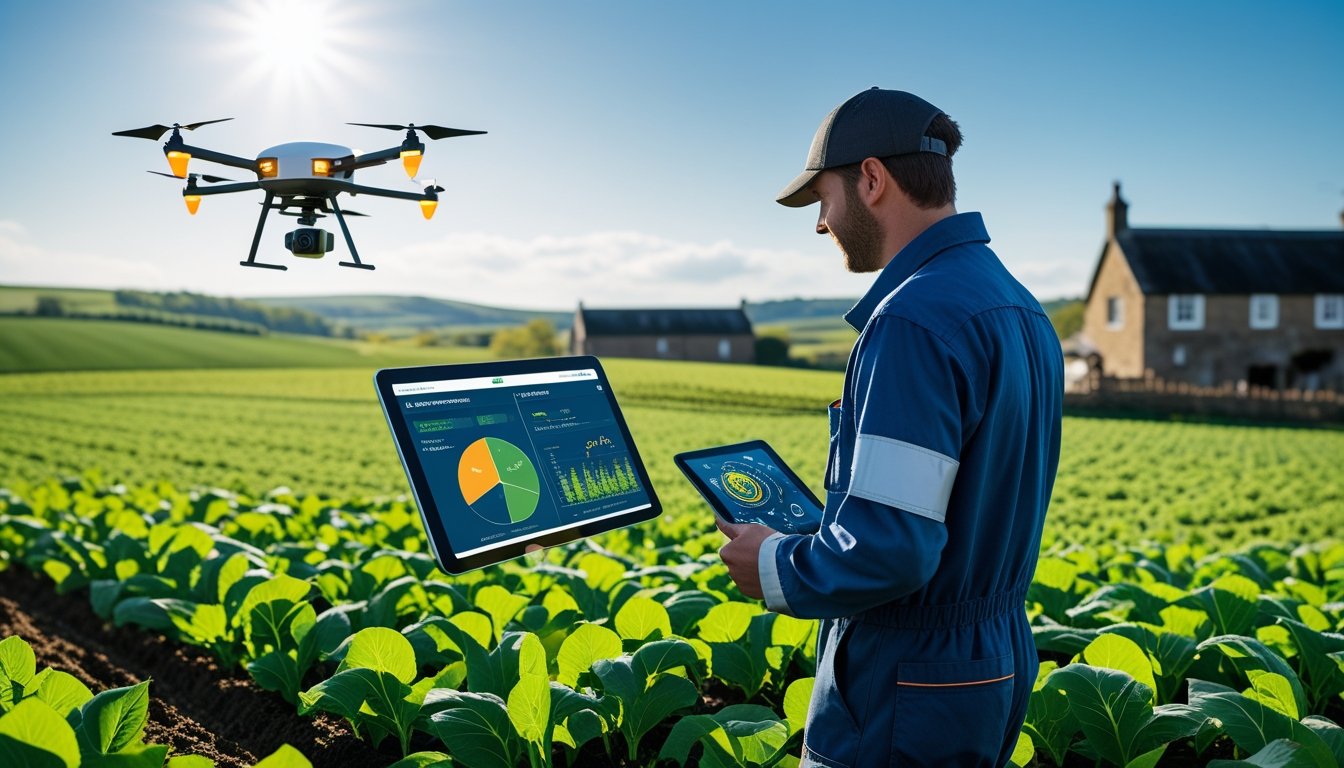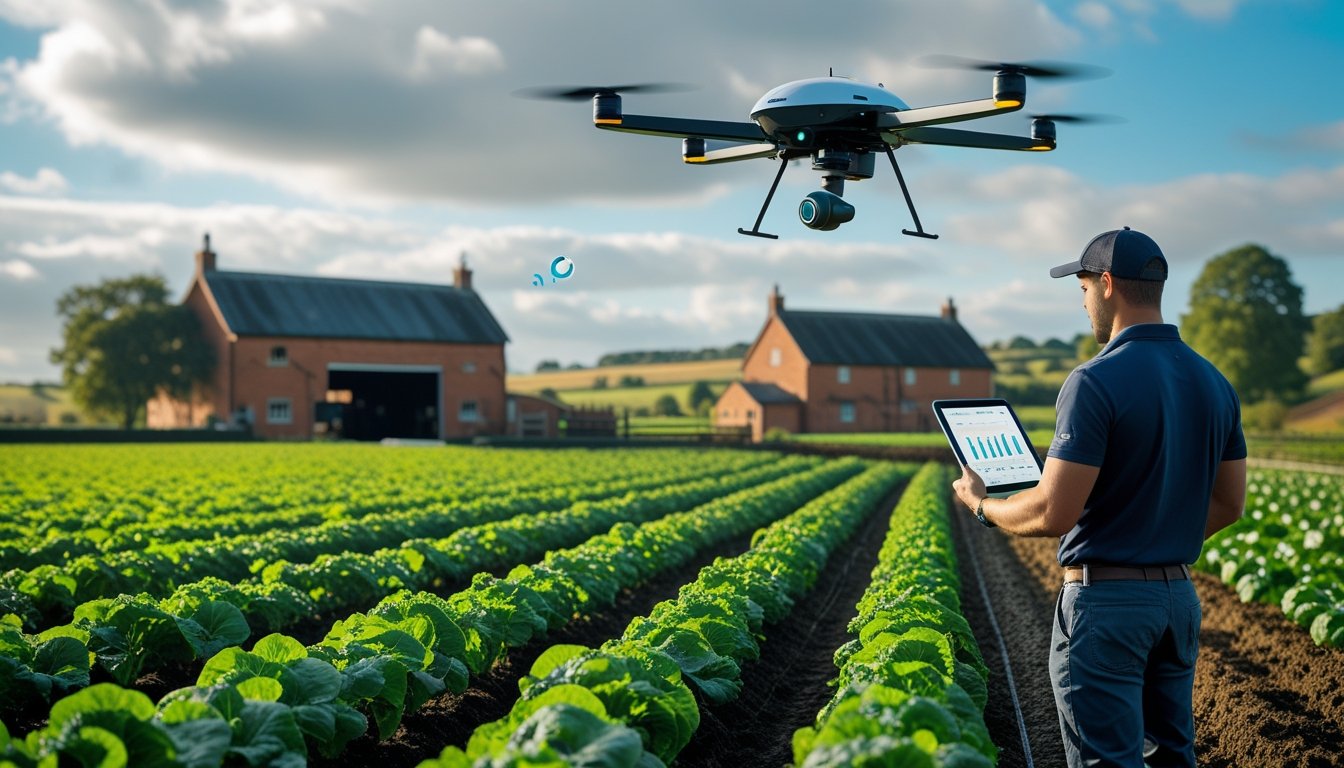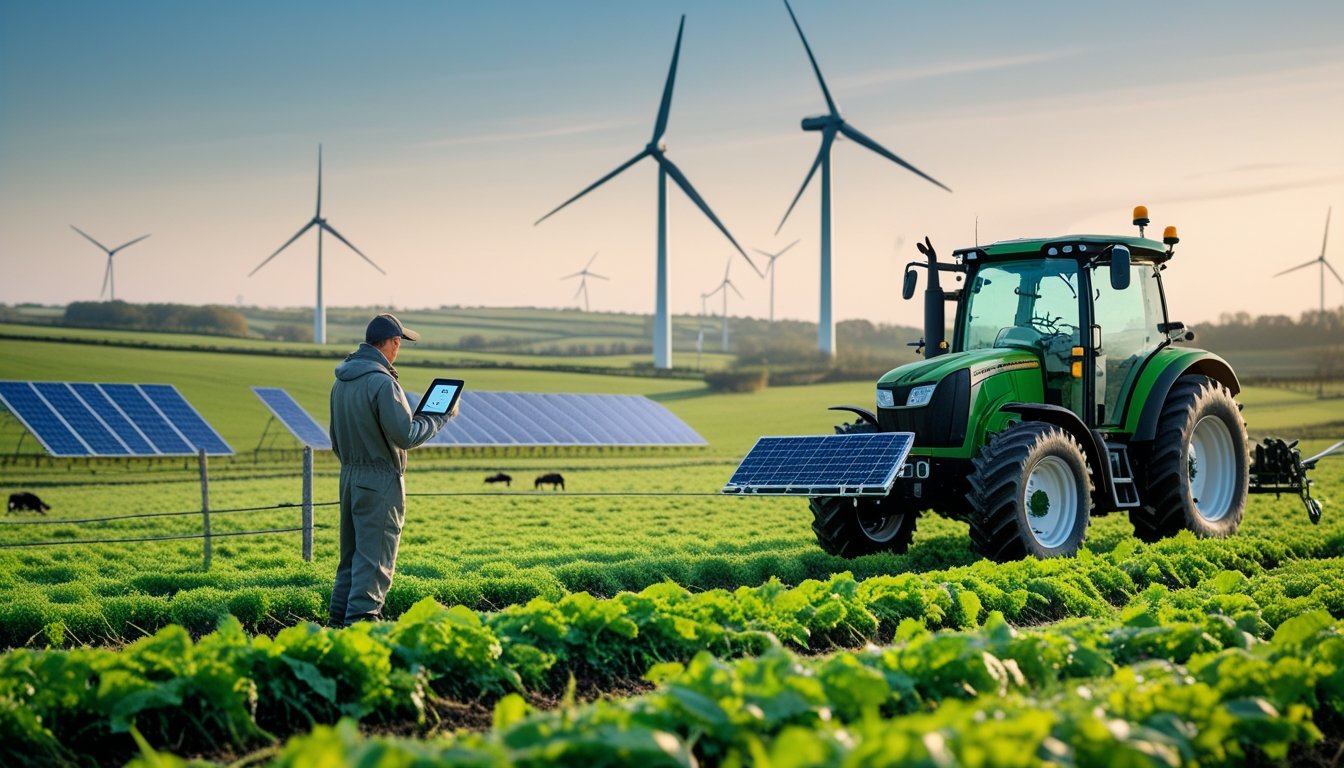Late updated: 11 Jun 2025 09:06
Written by: Oliver Bennett
AI Solutions For Sustainable Rural UK Farming Practices: Enhancing Efficiency and Sustainability
Artificial intelligence stands poised to redefine farming in rural UK, offering unprecedented opportunities for sustainable practices. AI systems are revolutionising our approach by enhancing productivity while minimising environmental impacts. Utilising advanced technologies, farmers can now harness precision tools such as digital twins and IoT devices, enabling data-driven decisions that improve efficiency and resource management.

Our farms are undergoing an evolution with technologies like smart farming tools, which allow us to practice more sustainable methods by predicting environmental conditions and tailoring practices accordingly. By integrating these solutions, we not only boost crop yields but also address critical challenges such as reducing carbon footprints and conserving water.
The shift towards AI-driven solutions highlights a collaborative future where technology supports agricultural resilience and sustainability. As we adopt these innovations, it becomes increasingly crucial to understand both their potential and the limitations faced, such as connectivity issues in rural areas. The promise of AI in agriculture represents a horizon rich with possibilities for enhancing the sustainability of rural UK farming.
Key Takeaways
- AI is transforming farming by improving productivity and reducing environmental impacts.
- Smart technologies are enabling sustainable practices by enhancing resource management.
- Connectivity challenges remain a significant hurdle for rural areas adopting AI solutions.
AI-Driven Innovations Transforming Sustainable Rural UK Farming

Integrating AI-driven innovations into rural UK farming enhances sustainability and productivity. These innovations utilise precision tools, smart data, and automated systems to manage resources efficiently and promote environmentally friendly practices.
Precision Agriculture and Smart Farming Applications
Precision agriculture leverages AI solutions and advanced sensors to gather data, offering farmers insights into soil conditions, weather patterns, and crop health. With this data, smart farming applications can optimise planting, watering, and fertilisation, tailoring strategies to specific field conditions.
Utilising digital twins, simulations allow farmers to model scenarios and predict outcomes, reducing input waste and promoting sustainable practices. The ability to apply resources precisely ensures minimal environmental impact, which supports biodiversity and soil health. Farmers benefit from improved yields and reduced costs.
Machine Learning and Predictive Analytics for Crop Management
Machine learning models have revolutionised crop management by using data analytics for decision-making. These models digest vast amounts of big data, uncovering patterns in crop growth and disease outbreaks. Predictive analytics guide farmers in making informed decisions about planting and harvesting times.
AI technology empowers us to anticipate pest infestations, allowing timely interventions that protect yields. Precision farming technologies ensure that interventions are targeted and effective, reducing chemical usage. This data-driven approach not only boosts productivity but also supports long-term sustainability in agriculture.
Automation, Robotics, and Autonomous Equipment in Farms
Robotics in farming introduces automation that performs repetitive tasks, such as planting, weeding, and harvesting, with remarkable efficiency. Autonomous tractors and drones equipped with AI systems bring precision to land management, executing operations without human intervention.
These innovations help manage vast hectares of land efficiently, cutting down labour costs and minimising human error. Autonomous equipment provides an environmentally friendly solution, optimising routes and reducing fuel consumption, contributing to sustainable farming practices that meet the needs of rural communities.
AI for Sustainable Livestock and Vertical Farming Systems
AI plays a pivotal role in sustainable livestock management. Smart systems monitor animal health, track behaviour patterns, and manage feeding schedules with precision. This leads to healthier livestock and more efficient production systems, ensuring animal welfare and resource management.
In addition, vertical farming incorporates AI to optimise growing conditions in controlled environments. This system uses sensors and automation to monitor crop growth, adjust lighting, and manage nutrients. Such innovations make urban agriculture feasible, reducing the pressure on rural lands and providing a blueprint for sustainable food production.
Optimising Sustainability, Productivity, and Environmental Protection Through Artificial Intelligence
Advancements in artificial intelligence are transforming sustainable farming practices by enabling precision targeting of resources, enhancing productivity, and reinforcing environmental protection. Our focus is on leveraging AI to optimise soil health, improve crop yields, and support effective farm management in rural UK communities.
Resource Efficiency: Soil Health, Nutrient Management, and Pest Control
AI technologies play a pivotal role in analysing soil health. By evaluating soil composition and moisture levels, AI systems help farmers make informed decisions on nutrient management. This ensures optimum crop growth and reduces unnecessary fertiliser application, thereby minimising adverse environmental impacts.
Pest control is another area where AI excels. Image recognition and predictive analytics enable quick identification and management of pest infestations. This targeted approach not only improves yields but also reduces the need for chemical pesticides, supporting sustainable agriculture.
Improving Food Security and Crop Yields in Rural Communities
AI-driven techniques are enhancing crop yields, which in turn strengthens food security. Utilising machine learning models to predict weather patterns and soil conditions allows farmers to implement adaptive strategies. This ensures the timely sowing and harvesting of crops, boosting productivity even under changing environmental conditions.
Such efficiency contributes directly to agricultural development. By improving yield forecasts and planning accordingly, we can maximise resource allocation and optimise farm productivity. This is vital for rural communities, where access to resources may be limited, and the impact of sustainable farming practices can be significant.
Data Analysis and AI-Driven Decision-Making for Farm Management
AI brings unparalleled precision to farm management through robust data analysis. By collecting and analysing vast amounts of data from sensors and drones, AI models generate actionable insights for effective decision-making. This assists in optimising irrigation, fertilisation schedules, and harvest timing.
Moreover, AI facilitates better resource allocation across the supply chain, from seed purchasing to distribution. This results in improved environmental sustainability and economic viability for farmers. Our approach underlines the importance of ongoing research and development in AI to continually refine these capabilities and achieve sustainable agricultural goals in the UK.
Frequently Asked Questions

In this section, we address the role of artificial intelligence in enhancing sustainable farming practices in rural UK agriculture. We explore best practices, water conservation, soil health, precision farming advancements, carbon emission reduction, and economic benefits.
What are the best practices for integrating artificial intelligence into UK agriculture to improve sustainability?
Integrating AI into UK agriculture involves implementing precision farming technologies, such as sensors and drones, to enhance monitoring and decision-making. Adopting AI-driven data analytics can help in managing resources more efficiently and predicting potential challenges. It's crucial to train staff on new technologies to ensure seamless integration into existing farming processes.
How can AI help in managing and conserving water resources in British farming?
AI technologies facilitate precise irrigation techniques, allowing farmers to optimise water usage by assessing soil moisture levels in real-time. Machine learning algorithms predict weather patterns, assisting in improved water management strategies. These solutions contribute to water conservation, particularly in regions where water scarcity is a pressing concern.
In what ways can artificial intelligence improve soil health and crop yields in the UK's rural farming?
By analysing soil data, AI can recommend tailored fertilisation and pest control plans, reducing chemical usage while boosting yields. AI tools monitor soil conditions, enabling timely interventions to enhance soil health. Crop simulation technologies model growth under various scenarios, helping farmers optimise planting and harvesting schedules.
What are the latest developments in precision farming with AI that UK farmers can adopt?
Recent advancements include the use of digital twins to simulate and predict crop growth, improving resource allocation. AI-powered drones and robotics assist in planting, weeding, and harvesting with precision. Enhanced imaging and data analytics tools provide insights into crop health and soil conditions, facilitating proactive management.
How can AI contribute to reducing carbon emissions in rural farming operations across the UK?
AI streamlines operations to reduce energy consumption and waste. By optimising supply chains, it minimises transport-related emissions. Automated machinery powered by renewable energy sources further contributes to lowering emissions. AI also aids in precision fertiliser application, reducing the release of greenhouse gases.
What are the potential economic benefits for UK farmers who implement AI-driven sustainable farming techniques?
AI-driven technologies lower operational costs by improving resource efficiency and reducing waste. Increased crop yields lead to higher revenue. Farmers benefit from better market positioning as they adopt sustainable practices that appeal to environmentally conscious consumers. Overall, AI adoption enhances long-term profitability while ensuring sustainable farming practices.
